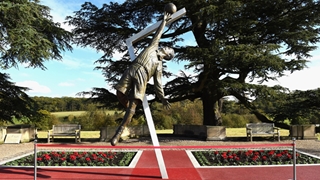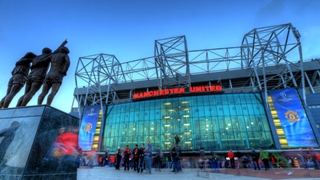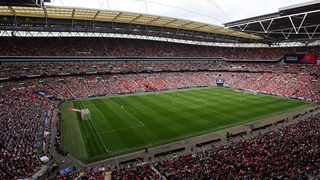
A statue honouring Arthur Wharton has been unveiled at St. George’s Park.
The 16-foot permanent memorial will recognise the pioneering achievements of Wharton, the world’s first black professional footballer.
The statue, by acclaimed sculptor Vivien Mallock, stands in the centre of the St. George's Cross in the memorial garden at the entrance to the National Football Centre.
Who was Arthur Wharton?
- Born in Jamestown, Gold Coast (now Accra, Ghana) in 1865
- His father was half-Grenadian and half-Scottish
- His mother was a member of the Fante Akan royalty
- Moved to England in 1882 to train as a Methodist missionary
- Turned professional in 1889 after signing for Rotherham – and became the world's first black professional footballer
Arthur Wharton was born in Ghana in 1865, moved to the UK in 1882 and was signed by Darlington at the age of 19.
He had moved to Darlington with the intention of training as a Methodist missionary but opted instead to become a full-time athlete.
And during a career that spanned 17 years, he went on to play as a goalkeeper for Preston North End, Rotherham Town, Sheffield United and Stockport County.
Not just skilled with a ball, Wharton was a true all-round athlete.
In 1886 he became the Amateur Athletics Association's national 100-yard running champion – and become the first man to run 100 yards in ten seconds flat.
Arthur Wharton's statue unveiled
He also excelled in cricket, boxing, cycling and rugby league and union before turning his full attention to football – in which he played primarily in goal, but also occasionally on the right wing.
St. George’s Park chairman David Sheepshanks conducted the ceremony and said: “Today is a historic day to mark the achievements and the legacy of the late great Arthur Wharton.
"But it’s also a future day because it’s a day that is going to inspire a whole new generation of young players and in particular young coaches to want to reach for the top and be the best they possibly can be.
"When you look at what this man achieved it’s simply extraordinary. Imagine the courage he had to display to achieve what he did in those days.
"We often talk how hard it is for young people from black and Asian minority backgrounds to get into top jobs today, so imagine what it was like then.
"Certainly not enough people know about his story and we’re going to embrace it in the tour programmes of all the young people and schools that come here.
Sheepshanks added: "We’re going to make sure his story is told to all the coach education cohorts that come through here – and that will manifest and grow and I think it will become a really important part of what St. George’s Park is all about.
"We are here to embrace talent from wherever it comes. Hopefully today will be a moment in time that everyone will look back and say ‘you know from that day onwards opportunities grew – no matter what background you came from’.
After suffering from a number of illnesses in later life, Arthur Wharton died penniless in 1930 and was buried in an unmarked grave in Edlington Cemetery in south Yorkshire.
However, his grave was given a headstone in 1997 after a campaign by anti-racism body ‘Football Unites, Racism Divides’, and six years later he was inducted into the English Football Hall of Fame in recognition of the impact he made on the game.
Shaun Campbell, founder of the Arthur Wharton Foundation, was also in attendance and said that the unveiling was not the end of a journey to get him the recognition he deserves, but the start of another tackling a global issue.
“To move forward we have to tackle racism on a global scale, but football can kick-off that campaign”
Shaun Campbell Arthur Wharton Foundation
“Today is a very proud day," he said. "It’s been a long journey but it’s one that’s been an absolute honour and a privilege to be part of.
“But this statue is not the end, it is the beginning. Football is part of the wider problem, but it is also the biggest army in the world. If you can unite the fans, the support base, it has the capacity to really make a difference – and it's very exciting.
"To move forward we have to tackle it on a global scale, but football can kick-off that campaign.
"You don’t have time to feel the stresses and strains of championing something like this because your own adversity can never match that which he faced.
"This is the beginning of true recognition for the black and ethnic minority groups to this country."









